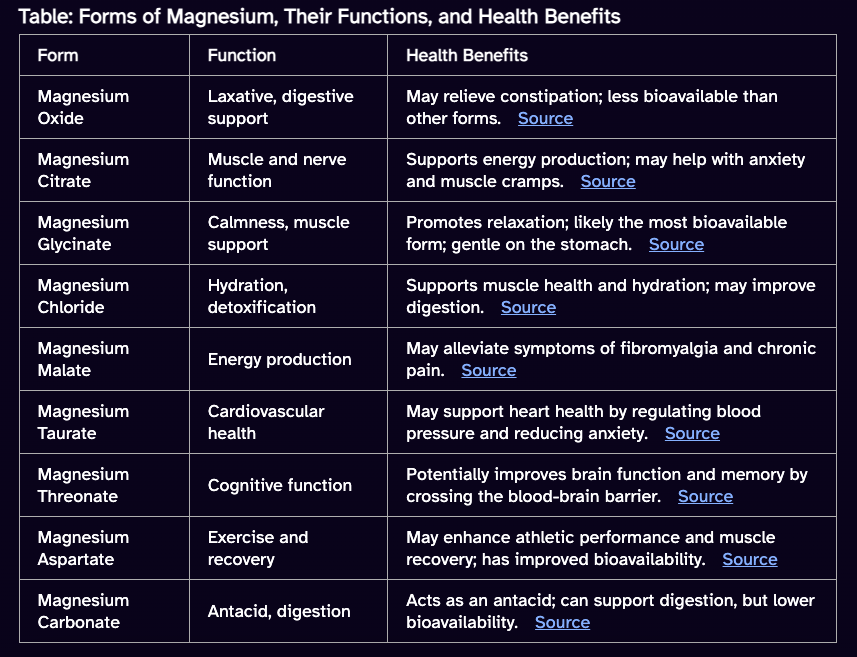Understanding Magnesium: The Different Forms, Functions, and Health Benefits
Magnesium is an essential mineral that plays a crucial role in numerous bodily functions, including energy production, muscle contraction, nerve transmission, and bone health. It’s abundant in many foods, yet many people do not get enough from their diet. There are several forms of magnesium supplements, each differing in absorption, bioavailability, and specific health benefits. Here, we will explore the various forms of magnesium, their functions, and the potential benefits and drawbacks of supplementation.
Table: Forms of Magnesium, Their Functions, and Health Benefits
Quality and Recommendations for Magnesium Supplements
Magnesium Oxide:
Bioavailability: Low
Recommendation: Not recommended as a primary magnesium supplement due to its lower absorption. Best for short-term use to relieve constipation.
Magnesium Citrate:
Bioavailability: Moderate to high
Recommendation: Good quality; widely accessible. Often recommended for general supplementation due to positive digestive effects.
Magnesium Glycinate:
Bioavailability: High
Recommendation: A preferred choice for individuals looking for anxiety relief and muscle support. Gentle on the stomach.
Magnesium Chloride:
Bioavailability: High
Recommendation: Generally deemed a good quality supplement; often found in topical applications for muscle benefits.
Magnesium Malate:
Bioavailability: Moderate
Recommendation: Suitable for those with fibromyalgia or chronic pain. Good quality, especially when combined with other supplements for recovery.
Magnesium Taurate:
Bioavailability: High
Recommendation: Beneficial for cardiovascular health; generally regarded as a good quality supplement.
Magnesium Threonate:
Bioavailability: High
Recommendation: Particularly recommended for cognitive enhancement but may be higher in price. Good quality; specific research focusing on nootropic benefits.
Magnesium Aspartate:
Bioavailability: Moderate
Recommendation: Suitable for recovery post-exercise, but avoid if you experience side effects from aspartame.
Magnesium Carbonate:
Bioavailability: Low
Recommendation: While often used as an antacid, it’s better to focus on forms with higher bioavailability for magnesium supplementation.
Conclusion
Magnesium supplementation can provide multifaceted health benefits, depending on the specific form used. For those considering taking magnesium, it is essential to recognize which form aligns best with their health goals, whether it be relaxation, energy production, or cardiovascular support. Moreover, emphasizing dietary sources—such as seeds, nuts, legumes, and leafy greens—alongside supplementation can help meet daily magnesium needs.
It's crucial to consult with a healthcare provider before starting any new supplement regimen, particularly if you have pre-existing health conditions or are taking medications. For further reading and research on magnesium’s benefits, consider checking resources such as the National Institutes of Health NIH Magnesium Fact Sheet and related peer-reviewed studies.
